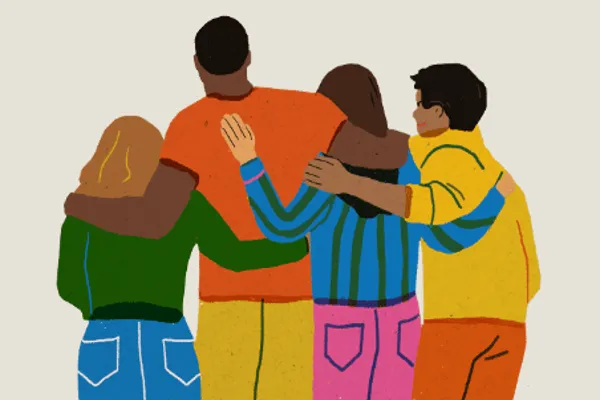
Rachel, Ross, Joey and the One Where We Talk About Friendships
As the holiday season approaches, we move into turkey, decorations, and the idea of spending time with family can be daunting. Enjoyable (maybe), but you also must contend with the weird uncle, politics at the dinner table, and passive-aggressive comments. UGH!
What if instead we discuss the importance of friendships? Friendships that allow for true connection, that strengthen over time, that can withstand disagreements, arguments, and even fights. The kind of friendship which connects to your soul. Let’s talk about it.
The Role of Friendships in Our Lives
Life has come to center around one primary type of relationship: love. Love often comes in the form of a partner, significant other, or romantic/intimate relationship. And this has become the one relationship to rule all others. The romantic relationship has become the “stand-in” for what used to be provided by a whole village: friend, confidant, counselor, cheerleader, and more. Society’s emphasis on romance often causes friendships to be put on the back burner, yet friendships are an essential part of human history.
Throughout history, friendships have held diverse meanings:
Aristotle: Distinguished friendships as benefit-based, mutual pleasure, or shared values.
Renaissance Era: Friendships extended societal relationships like relatives and neighbors, creating essential networks.
Enlightenment: Focused on loving your friend and neighbor, idealizing platonic relationships.
In today’s world, how can we engage in friendships to develop joy and fulfillment?
Friendship Can Be Hard—But Worth It
Let’s be honest. Friendships can be hard. Making friends is hard, maintaining friendships can be time-consuming in an already busy life, and past hurts from "friends" can make us hesitant. That’s difficult.
AND
Sometimes, a friend is the only person who can say the right thing we need to hear. Who can lend support you didn’t even know you needed. A friend can heal you without being the person who caused the hurt. Friendship is worth our time. (And you don’t have to take my word for it—science agrees!)
Friendship and Well-Being: The Science
A 2021 global study on friendship with 323,200 participants across 99 countries found that people who prioritize friendships live happier and healthier lives, regardless of culture. This connects friendship directly to overall well-being. In our world of social media and individualism, doesn’t connection, support, love, and understanding sound downright revolutionary?
Stages of Friendship
Let’s explore the different levels of friendship and ways to bond, helping you grow your own connections, whether you’re starting fresh or looking to deepen existing relationships.
1. Strangers
Strangers include your coffee barista, the parent next to you at school pick-up, or anyone you don’t know yet. Interestingly, this is where all friendships start. First impressions play a significant role at this stage. Tip: If you can impart a good feeling, it may lead to ongoing relationships.
2. Acquaintances
Acquaintances are people you know on a surface level, like a co-worker you chat about the weather with or a neighbor you wave at. This is the stage where you decide whether to know someone more. Tip: If you find them interesting, be courageous and invite them for coffee.
3. Casual Friends
The "lite" version of friendship. These friends might be from a book club, happy hour, or childhood. You have planned meetups and start investing in one another. Tip: Open up more about your life to see if they are willing to reciprocate.
4. Close Friends
Close friends are personally and emotionally invested in one another. They share goals, dreams, doubts, and failures. Close friends navigate misunderstandings and conflicts with an intent to repair. Tip: How is vulnerability from both sides? Vulnerability can unite.
5. Intimate Friends
At this stage, friendship thrives on shared experiences and deep vulnerability. These friends are committed to your character development, challenging you to grow while offering love and support. Tip: Provide loving feedback and challenge one another to grow.
Why Friendship Matters
Friendship is an amazing journey that I wish for everyone. Friends can show up in many different ways in our lives. If I could prescribe one thing for everyone, it’s a pal, a friend, a true connection. Reach out to your friends and assess if there are any you’d like to develop further. If you don’t have a big circle of friends, that’s okay. Focus on building one meaningful relationship.
As you travel down the road and back again, it’s wonderful to share your life and thank your friends for being there (Golden Girls tribute!).
All my best,
Coach Mai Lee
Works Cited
Gorecki, Rich. “The History of Friendship.” GodBuddies, 20 Jan. 2022, www.god-buddies.com/the-history-of-friendship/.
Lu, Peiqi, et al. “Friendship Importance around the World: Links to Cultural Factors, Health, and Well-Being.” Frontiers in Psychology, vol. 11, no. 1, 18 Jan. 2021, www.ncbi.nlm.nih.gov/pmc/articles/PMC7848226/, https://doi.org/10.3389/fpsyg.2020.570839.
Mia. “History of Friendship: From Ancient Times to the XXI Century.” Youth Time Magazine, 5 Feb. 2016, youthtimemag.com/history-of-friendship-from-ancient-times-to-the-xxi-century/.
New York Times Podcasts. “What Relationships Would You Want, If You Believed They Were Possible?” YouTube, 6 Feb. 2024, www.youtube.com/watch?v=7tvCuA6Pydo. Accessed 17 Nov. 2024.
Tucker, Jermaine. “Stages of Friendship.” Humans, 2017, vocal.media/humans/stages-of-friendship.

